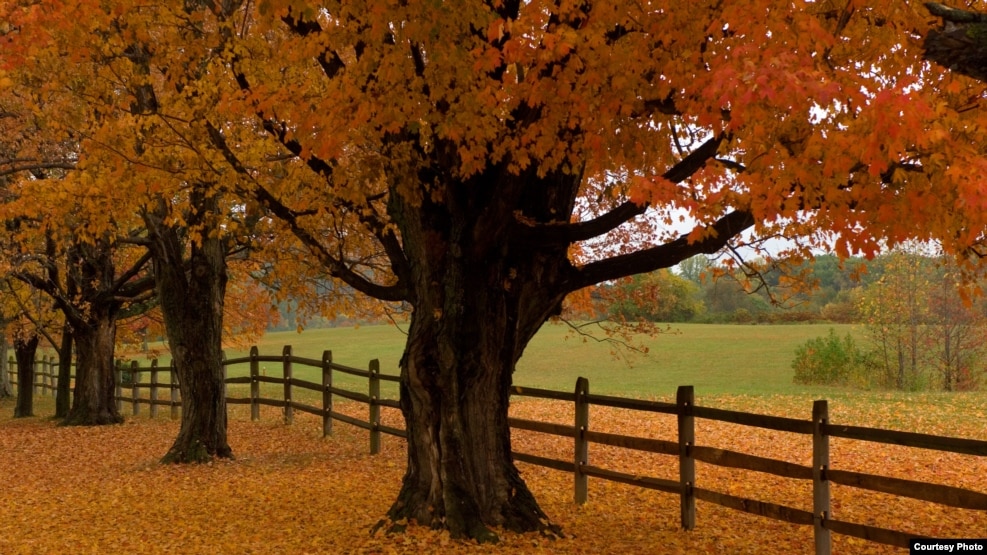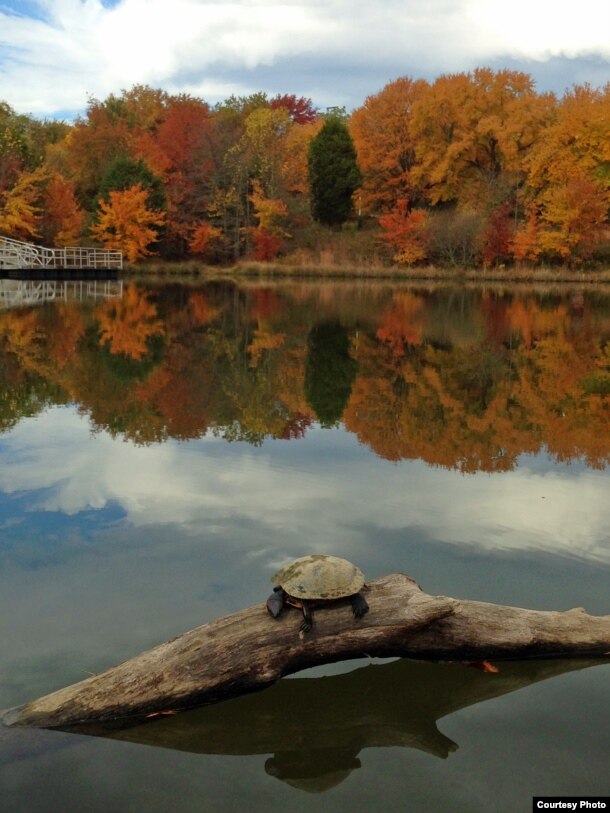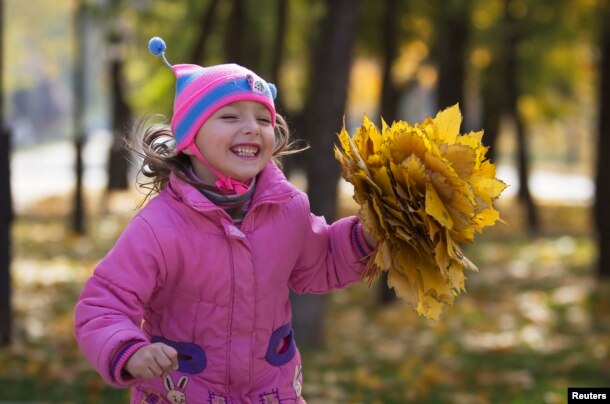Goodbye, Summer. Hello, Autumn.
——————————————————————————————
[美语论坛]:http://bbs.wenxuecity.com/mysj/
———————————————————————————————

This colorful autumn tree-lined drive is part of a farm in Virginia near Washington, D.C. (PHOTO/Kenneth Garrett Photography)
词汇典故:Goodbye, Summer. Hello, Autumn. Or Is It Fall?(音频文字)ZT
http://av.voanews.com/clips/VLE/2016/09/22/5d5a46da-649c-4d81-b8c6-f540d5a0f79c_hq.mp3
Now the VOA Learning English program, Words and Their Stories.
This is the program that explores the origin and uses of popular words and expressions in American English. Today, we are going to talk about “autumn.”
In half of the world, summer has come to an end. Swimming pools have closed. Children are back in school. The days grow shorter, and the weather cooler.

A turtle enjoys the sun on a chilly autumn day at a park in Virginia. (Diaa Bekheet/VOA)
In many parts of the United States, trees appear on fire as their leaves turn brilliant shades of gold, orange and red.
From the Pacific Northwest to New England to the Mid-Atlantic and Appalachian states -- the autumn leaf-changing scenery is breath-taking.
Autumn is also called “fall.” This is probably because it is the time when trees lose their leaves and they fall to the ground.

Kids all over the world like to play in the fallen leaves of autumn.
During fall, children around the United States love to gather leaves into large piles and jump into them.
But why do we have two names for one season?
In the English language, calling the season “autumn” first began in the 12th century. But the word was not commonly used until about the 16th? century. This is about the same time that people began using the word “fall” to mean autumn.
However, even earlier, the season was called “harvest.”
In the early days of the United States, autumn was a time for preparing for the winter months by collecting and preserving food. People gathered corn, nuts and berries. They also dried and salted meats to feed them through the long, cold winter.
In modern times, refrigeration, grocery stores and pizza delivery help us survive through winter. But in autumn we still need to prepare.
If you have a fireplace or a wood stove in your home, you will collect, chop or buy firewood. You may also need to prepare your home by fixing or weather-proofing doors and windows.
If you have a car, you make sure the tires and fluids are also ready for the cold winter months. These preparations are called winterizing.
Actually, many people winterize their wardrobes, too. They put away their lightweight summer clothes and flip flops, and bring out their coats, sweaters and boots.
To prepare for the winter months, some animals gather food. The squirrel is well known for its skill in this activity.
Squirrels gather and store seeds and nuts in their nests. They search the ground for fallen nuts. They pick nuts from tree limbs, sometimes throwing them down to the ground below.
This hoarding helps them survive the winter. And it gives us a common expression.
To squirrel something away means to save it for future use. Things you squirrel away become your stash. We often use this expression when talking about money and food. But any resource you may need later can be squirreled away.
For example, a child might squirrel away chocolate, hiding their stash from brothers and sisters. This guarantees the child can satisfy their sweet tooth at any time.
Unlike squirrels, you can squirrel things away during any time of the year. Also, unlike squirrels -- who are furry flurries of activity during the autumn -- many people slow down during this time. The expression autumn years refers to the later years of a person’s life, especially after a person has stopped working.
For example, “She worked hard her entire life. She saved her money and invested it wisely. So, she was able to enjoy her autumn years in comfort. She was finally able to travel around the world.”
This time of life can also be called “twilight years.” Regardless of your age, autumn can be a sad time for gardeners. People who spent the entire summer cultivating their gardens may feel sad to see the empty garden beds of autumn.
The poem “September Tomatoes” is for those people.
(("September Tomatoes” by Karina Borowicz))
As summer ends, so does this episode of Words and Their Stories. And like summer, we will return, not in a year, but rather next week.
________________________________________________________________
Words in This Stories
winterize – v. to make (something) able to resist the effects of winter weather
wardrobe – n. a collection of clothes that a person owns or wears
flip flops – n. a type of loose rubber sandal
hoard – v. to collect and hide a large amount of (something valuable)
squirrel something away -v. to save something for future use
stash – n. an amount of something that is stored or hidden
sweet tooth – n. a liking for sweet foods
autumn years --n. later years of a person’s life
furry – adj. covered with fur
flurry – n. a brief period of excitement or activity
cultivate – v. to prepare and use (soil) for growing plants
whiskey – n. a strong alcoholic drink made from a grain (such as rye, corn, or barley)
claw – n. a body part of an animal (such as a lobster or crab) that is used for gripping and holding things : Note: in the poem, the plants are given “claws,” an animal feature, to show they are hanging on.
compost – n. a decayed mixture of plants (such as leaves and grass) that is used to improve the soil in a garden
flax – n. a plant that has blue flowers and that is grown for its fiber and its seed
________________________________________________________________
英诗:If You Were Coming In The Fall 作者:艾米莉·狄更生 朗诵:平睦恺
http://bbs.wenxuecity.com/yingyumeiwen/195118.html
英语歌曲: Autumn http://bbs.wenxuecity.com/mysj/161618.html
———————————————————————————————
https://www.youtube.com/watch?v=o9reuCbOMJU
Song: Forever Autumn
Artist: Lake of Tears
So the season of the fall begins
Down the crossroads in a sleepy little inn
By the fire when the sun goes down
But the night becomes you
And the secrets of the rain
Forever autumn
And the season of the fall begins
Out the nightlands when the thunderstorm sets in
The secrets clear in the cloudy night
But the night becomes you
And the secrets of the ra n they will stay the same
And the time will come soon
With the secrets of the rain and the storm again
Coming closer every day, forever autumn
And the season of the fall begins
Past the pass ngbell past willow s weeping
A ripple forms on the brinks of time
But the night becomes you
And the secrets of the rain, they will stay the same
And the time will come soon
With the secrets of the rain and the storm again
Coming closer every day forever autumn
https://www.youtube.com/watch?v=oK27nYSR5rw
Autumn Leaves by Paula Cole